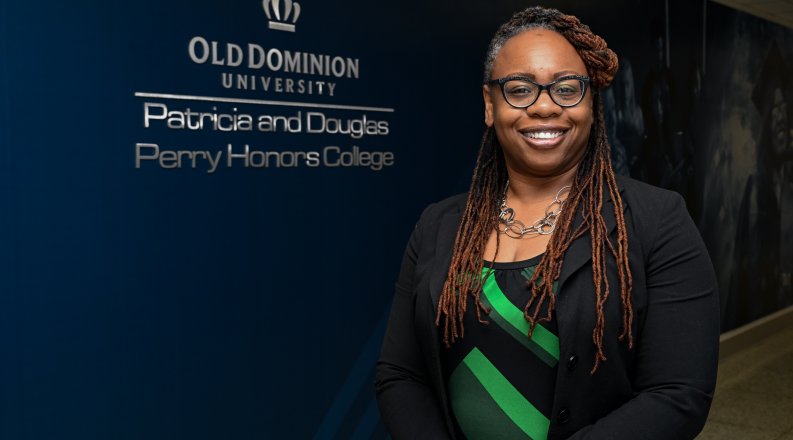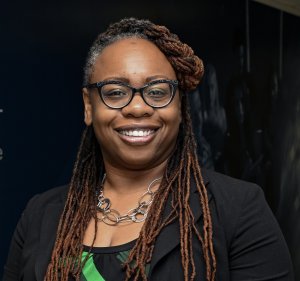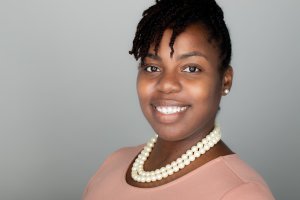In August 2021, the Virginia Gazette reported that the rate at which Black people in Hampton Roads died from opioid overdoses jumped from 11.8 to 27.9 per 100,000 of the population between 2019 and 2020.
For the first time, more Black people died from opioid overdoses than white people statewide in 2020, and Black men experienced the highest fatal opioid overdose ever recorded: 45.5 per 100,000.
Impacts of the COVID-19 pandemic — isolation, job loss — as well as mistrust between Black communities and recovery health care resources, were highlighted as contributing factors. Fentanyl and other synthetic opioids have been fueling the crisis. According to the Center for Disease Control and Prevention, 220 people died each day from an opioid overdose in 2021 nationwide.
A group of investigators from Old Dominion University, led by associate professor Shuntay Tarver, are hoping to shine a light on existing gaps between those needing help to treat their opioid addiction and those providing treatment. They want to establish a framework that removes barriers to care such as cultural stigma, threat of family separation and economic issues that discourage help-seeking behaviors.
Their efforts are specifically aimed at decreasing opioid and substance use among Black families across Norfolk, Newport News and Hampton by tapping into the collective power of small churches, grassroots organizations and other community stakeholders.
“I do want to be clear that regional coalitions exist. They exist in Norfolk, they exist in Hampton, they exist in Newport News and of course in all of these surrounding cities. But making sure that (services) are accessible to the most vulnerable populations is our goal,” said Tarver, who is serving as principal investigator on a two-year $150,000 community planning grant awarded by the Jeffress Trust foundation.
“So, it's really about assessing what's going on, finding out what the gaps are, and making those things accessible to those who need it,” she said.
The team includes ODU adjunct instructor Tamika Lett and assistant professor Chaniece Winfield. Latiesha Handie, director of youth and young adult opportunities for Hampton, is also part of the effort.
A trio of ODU undergraduates are a part of the team as well, Tarver said. Their participation offers them not only traditional research opportunities such as data collection and analysis but also hands on exposure to see that data at work in the community, which greatly enriches their educational experiences, Tarver said.
In May, Tarver was named interim dean of the Perry Honors College after serving for several months as associate dean. A principal responsibility of her new role relates to undergraduate research.
“Now I can teach more people how to use these empirical tools to do the work of the community,” Tarver said.
Driven by personal experience
Tarver said most of her professional journey has been experientially driven. The reason she pursued social work is intimately tied to being the survivor of a parent who committed suicide, she said. But in all her years as a practitioner, she had never really focused on substance abuse.
"That wasn't my thing, it wasn't a part of my story,” she said. “I don't think there's a person that's not touched by substance use in some capacity, but it didn't hit center stage for me until 2017."
That year she was a member of a small church in Hampton, where she lives. Tarver and a "dear sister," named Tanya with whom she was part of the church’s praise team and choir, were leading a women's ministry retreat. They began talking about breaking the stigmas surrounding mental health and addiction.
"Through this work with her, I became aware of her journey with struggling with addiction," Tarver said. She learned her friend was relapsing.
In early December of that year, Tarver joined a rotation of other church members as they supported Tanya, who was trying to kick her addiction by going cold-turkey and was experiencing active withdrawals. Tarver had never seen anything like it before, she said – she was taken aback.
“You're thirsty, but you can't keep water down. You're cold. You're shaking. And I'm confused,” Tarver recalled.
Even as she battled the effects of withdrawal, Tarver’s friend teased her as Tarver sought out more information online to try to help.
“I'm Googling and talking to her. She's laughing at me 'cause I'm Googling. She's like, ‘You're such a nerd.’”
Two months later, Tarver got the call that Tanya had died from an opioid overdose, leaving behind a 5-year-old daughter.
“I immediately thought, ‘What else should we have done?’” Tarver said. “We couldn't pray it away; trust me. I was praying with her, too."
The experience inspired Tarver to reach out to community partners to conduct a small pilot study funded by the National Organization of Human Services.
"We interviewed pastor after pastor about their preparedness to address issues of addiction in their congregation,” Tarver said. “Most people had no idea where to go or what to do, let alone the resources that exist.”
That work eventually led to the development of the planning grant Tarver and her co-investigators submitted to Jeffress Trust, and for which they received funding in July 2023.
The Thomas F. and Kate Miller Jeffress Memorial Trust, founded in 1981 by Robert M. Jeffress in memory of his parents, supports medical and scientific research across the state. In past years, it has focused on supporting scientists and research in fields like astrophysics, mathematical biology and drug development. In 2022, the awards program shifted gears toward supporting research that advances health equity for all Virginians by addressing the root causes and systemic barriers that drive inequity.
Jackie Stein, ODU's director of research and development, said it is a highly competitive grant and Tarver and her team are among the first cohort to be awarded under the program’s redefined mission.
"It's a brilliant choice of project,” Stein said, adding that it will “do a better job of meeting people where they are, and that is what's going to help get people into services that will benefit them."
“I see this as a huge point of pride for the University,” she said.
Getting to work
Education and needs assessments are key components to their work, according to Tarver's co-investigators.
“There's a lack of education surrounding treatment for opioids," said Lett, an ODU alumna — who was recently named by the University’s Alumni Association among its top 40 under 40 — and adjunct instructor in the Department of Counseling and Human Services.
Lett is a certified diversity professional and substance abuse counselor with more than two decades of experience. She said there is skepticism within Black and brown communities regarding medication-assisted treatment for opioids, which combines prescription medication such as Buprenorphine, methadone and naltrexone with counseling and behavioral therapies to help people recover from opioid dependency.
"A lot of the individuals in the minority communities stray away from services because of mistrust, thinking they're going to break the family up, they're going to go to jail,” Lett said.
Historically, those kinds of experiences have disproportionately impacted Black families compared to white families, she noted. Strides have been made more recently toward keeping families together and including them as part of a person’s substance use treatment journey, she added.
“But a lot of them don't know this,” Lett said.
There are also misconceptions about Good Samaritan laws, which protect people who call to report an overdose. And in some instances, a church may host a Narcotics Anonymous group but has had no training on how to administer Narcan, a medication that can reverse an overdose from opioids.
"It's just really sad because we could be saving more lives if we have more education surrounding these safety measures that have been put in place," Lett said.
Part of the team’s work is assessing community needs.
"We're going out, we're doing these interviews and seeing what's lacking, where the gaps are,” Lett said. "The long-term goal is to address these gaps through building a coalition of leaders and champions and change makers in the Hampton Roads community surrounding opioid use, particularly with minorities."
Winfield, an assistant professor of human services at Old Dominion who also serves as the Human Services Online Program Coordinator, said her role on the grant team is to produce needs-based assessments and presentations on all the current trends as it relates to opiate usage in Black communities.
The data they gather will be translated into a solution-focused understanding of what the numbers mean, tying needs to resources that are readily available but may not be widely known in the Black community, she said.
“We’re really putting that research out there so other entities that maybe have a longer or deeper reach can do things like mobile clinics or other things that we can't do as a small research team,” Winfield said.
They are looking to partner with community services support agencies, police departments, and pastors whom they hope will disseminate information.
"In the Black community, church is like a second home outside of the immediate family,” Winfield said. “They will definitely listen to a pastor, a first lady or just the church itself because they trust the church.”
Winfield stressed the importance of providers involving the church and the family as part of a person’s recovery journey.
“Recovery research supports longer success outcomes when there are support systems involved with that individual,” she said.
At a very minimum, the investigators say they hope they can remove the veil between health providers and the Black community and lessen some of the stigma and mistrust surrounding opioid addiction and those seeking help to overcome it.
Lett said she is hopeful, even if the wins are incremental. “Hope comes from working in the field and seeing what little change can happen,” she said. “Just having a couple of people come to that treatment is significant in itself.”






